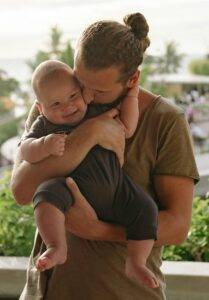Every parent dreams of watching their child grow, learn, and develop into a healthy, happy adult. However, navigating the stages of child development can be a challenge. There’s no book or manual on parenting, and it’s sometimes difficult to know if your child is meeting milestones or if additional support is needed. This guide will walk you through the stages of child development, outline key milestones, and provide tips to help you support your child’s growth.
The Complex Process of Child Development
Child development refers to the changes children undergo from birth through adolescence. It encompasses growth areas, including physical, emotional, cognitive, and social development. Understanding these areas helps parents recognize development patterns, address concerns, and foster an environment that promotes healthy growth.
The Major Areas of Child Development
- Physical Development: This refers to the growth of the body, including gross motor skills (like running and jumping) and fine motor skills (like grasping and manipulating objects).
- Cognitive Development: This area focuses on how children think, explore, and figure things out. Cognitive development includes problem-solving, memory, and learning and understanding.
- Social and Emotional Development: Social skills and emotional regulation are developed in this domain, which involves learning to interact with others, form relationships, and manage feelings.
- Language and Communication Development: The ability to understand and use language is key in this area, which includes verbal (spoken) and non-verbal (gestures, facial expressions) communication.
Each area of child development is interconnected, meaning progress in one domain influences growth in another. For example, a child’s physical ability to pick up a crayon also spurs cognitive development through drawing or writing.
The Stages of Child Development: What to Expect
Children develop in stages, each phase characterized by new challenges and opportunities for learning and achievements. Understanding the stages of child development helps parents recognize milestones and support their child’s growth. These child development stages are divided into five categories; each has unique milestones and developmental tasks that children typically achieve.
Stage 1: Infancy (0-2 years)
The first stage of child development, infancy is one of the most rapid periods of growth in a child’s life. During these first two years, babies experience significant physical and cognitive development. The brain forms millions of new connections, and infants develop an understanding of the world around them.
Key Milestones:
- Physical Development: From birth, babies develop muscle control and coordination. Newborns start with basic reflexes such as sucking and grasping, but over time, they become purposeful. Babies learn to lift their heads, roll over, sit up, and crawl. By the end of this stage, they take their first steps. Fine motor skills develop, such as grasping and transferring objects from one hand to the other hand.
- Cognitive Development: This is all about exploration. Babies learn by observing, touching, and interacting with their environment. They recognize familiar faces, learn object permanence (the understanding that objects continue to exist even when out of sight), and develop early problem-solving skills. Infants are curious and eager to learn, soaking up information from everything they encounter. Infants understand cause and effect. For example, shaking a rattle creates a sound.
- Language Development: Babies babble around six months and say a few words, like “mama” or “dada,” by their first birthday.
- Social and Emotional Development: Infants form strong attachments to their caregivers, learning to trust those who respond to their needs.
How to Support Your Infant’s Development:
- Engage with your baby through play: Simple games like peekaboo help develop social and cognitive skills.
- Provide tummy time daily: This strengthens their muscles, which is crucial for motor development.
- Talk and sing to your baby: Narrating your day or reading books fosters early language development, even if your baby isn’t speaking yet.
- Offer comfort and security: Responding to your baby’s needs creates a sense of safety and promotes emotional health.
Stage 2: Toddlerhood (2-3 years)
Toddlers are known for their boundless energy and curiosity. Increasing independence and emotional exploration are hallmarks of toddlerhood. While toddlers are eager to explore their environment, they assert their will—leading to the infamous “terrible twos.”
Key Milestones:
- Physical Development: Toddlers walk, run, and climb. Fine motor skills improve as they stack blocks, turn pages in a book, and scribble with crayons.
- Cognitive Development: Toddlers solve simple problems, such as getting a toy from a high shelf. They engage in pretend play, using objects to represent other things (e.g., a block becomes a car).
- Language Development: Vocabulary explodes during this stage. Toddlers learn new words daily. By age three, many children form simple sentences.
- Social and Emotional Development: Toddlers experience a wide range of emotions and have tantrums as they navigate feelings like frustration and excitement.
How to Support Your Toddler’s Development:
- Encourage physical activity: Let your toddler climb, run, and explore in safe environments. This helps develop coordination and strength.
- Play pretend games: Imaginative play is an excellent way to support cognitive and social growth.
- Read together daily: This supports language development and strengthens your bond.
- Offer choices: When possible, give your toddler a sense of control and foster independence.
- Be patient with emotional outbursts: Tantrums are normal at this age. Help your toddler learn to identify and express their feelings.
Stage 3: Preschool (3-5 years)
The preschool years of child development witness rapid improvements in language, cognition, and social skills. As children enter preschool or daycare, they interact more with peers, which helps them learn critical social skills like sharing and cooperation.
Key Milestones:
- Physical Development: Preschoolers hop, skip, throw, and catch a ball. Fine motor skills allow them to begin drawing recognizable shapes and letters.
- Cognitive Development: Children at this stage develop a basic understanding of time, sort objects by size or color, and engage in more complex pretend play.
- Language Development: Preschoolers speak in full sentences and understand multi-step instructions. They love asking questions and telling stories.
- Social and Emotional Development: Preschoolers form friendships and learn to navigate group dynamics. They also learn to regulate their emotions better, though conflicts with peers are still common.
How to Support Your Preschooler’s Development:
- Foster early literacy: Read and engage in activities such as identifying letters and practicing writing.
- Foster language growth: Ask open-ended questions to get your child talking, and continue reading together to build vocabulary and comprehension.
- Encourage creative activities: Drawing, painting, and playing with clay help develop fine motor skills and creativity.
- Encourage imaginative play: Support cognitive and social development. Pretend play helps children practice problem-solving and empathy.
- Teach problem-solving skills: Encourage your child to think through challenges and offer praise for their efforts.
- Provide opportunities for social interaction: Arrange playdates or group activities to help your child practice sharing and cooperation.
- Model appropriate social behavior: Teach empathy, sharing, and conflict resolution.
- Promote independence: Allow your child to complete simple tasks like dressing themselves or setting the table.
Stage 4: Early School Age (6-8 years)
Children begin formal education, which brings new cognitive, social, and emotional challenges. They also become more independent but still rely on their caregivers for emotional support and guidance.
Key Milestones:
- Physical Development: Children become more coordinated, and many enjoy organized sports or physical activities that require skill.
- Cognitive Development: This is a time of significant academic learning. Children are developing reading and writing skills, mastering basic math, and learning to apply logic and reasoning to problems.
- Language Development: Children in this age group have more complex conversations, understand humor, and learn new vocabulary quickly.
- Social and Emotional Development: Peer relationships become more important, and children understand concepts like fairness and justice.
How to Support Your School-Age Child’s Development:
- Support academic learning: Support your child’s learning by creating a routine for homework, and providing books, educational games, and other resources that spark their interest. Offer help when needed, and encourage curiosity and problem-solving.
- Stay involved in their education: Show interest in their schoolwork and communicate with teachers to ensure your child gets the support they need.
- Encourage a love of reading: Read together and discuss stories.
- Promote physical activity: Participation in sports or active play builds physical strength and social skills.
- Help your child manage emotions: Teach your child strategies for handling frustration, disappointment, and conflict healthily.
- Help your child navigate friendships: Teach empathy, conflict resolution, and the importance of kindness.
Stage 5: Adolescence (9-18 years)
Adolescence is a time of major physical, emotional, and social changes. As children approach and enter puberty, they experience growth spurts, hormonal changes, and shifts in their social world. Adolescents also seek greater independence, testing limits as they develop their own identities.
Key Milestones:
- Physical Development: Adolescents go through puberty, which involves rapid physical growth, sexual development, and changes in body composition.
- Cognitive Development: Teenagers develop advanced reasoning skills, abstract thinking, and the ability to consider hypothetical situations.
- Language Development: Adolescents understand and use complex language, including sarcasm and figurative speech. They also refine their written and oral communication skills.
- Social and Emotional Development: Identity formation is a key task of adolescence. Teenagers seek greater autonomy from their parents, place more importance on peer relationships, and start exploring romantic interests.
How to Support Your Teen’s Development:
- Encourage open communication: Create a safe space for your teen to express their thoughts and feelings without judgment. Also, discuss important topics like peer pressure, mental health, and responsible decision-making.
- Respect their growing independence: Allow your teen to make decisions and learn from their mistakes while providing guidance when necessary.
- Promote healthy and safe habits: Encourage physical activity, healthy eating, and good sleep hygiene to support their physical and emotional well-being.
- Support their interests: Encourage them to explore new hobbies, join clubs, or participate in extracurricular activities.
Common Child Development Concerns
While every child develops at their own pace, it’s natural for parents to have concerns when their child seems to lag behind typical milestones. Remember that delays in meeting milestones don’t always indicate a problem. If you have concerns about your child’s development, discuss them with your pediatrician. Early intervention addresses many potential issues and helps your child stay on track. Here are a few areas where delays might occur and what to watch for in child development:
- Speech Delays: If your child is not using words by age two or has difficulty forming sentences by age three, it might indicate a speech or language delay. Your pediatrician may recommend consulting a speech therapist for further management.
- Gross Motor Delays: If your child isn’t walking by 18 months or struggles with coordination beyond age four, a pediatrician assesses whether intervention is needed. In this case, physical therapy may be beneficial.
- Social Development Concerns: Children who have trouble making friends, managing emotions, interacting with peers, or adjusting to social settings might benefit from additional support or guidance. Your pediatrician might collaborate with a child psychologist for expert opinion and assessment.
Support Your Child—Guide, Nurture, and Celebrate Their Growth Journey
Child development is a fascinating and complex process that unfolds uniquely for each child over many years. As a parent, understanding the stages of development and the associated milestones helps you to provide the right support and encouragement at every step your child needs in their growth journey. From the early days of infancy through the challenges of adolescence, your role is to guide, nurture, and celebrate each step your child takes.
Every child is unique, and their development may not always follow a textbook timeline. However, with the right support, encouragement, and attention, your child can thrive in each stage of life. By fostering a loving, stimulating, and safe environment, you help your child grow into a confident, healthy, and capable individual. Stay informed, trust your instincts, and enjoy the amazing journey of watching your child thrive!
If you’re concerned about your child’s development, don’t hesitate to seek a healthcare professional. Consult resources like Omegapediatrics–your experienced pediatrician offers personalized advice tailored to your child’s needs, and provides assessments and recommendations to ensure your child receives the support they need. For more insight into specific developmental milestones, check out our related articles at Omegapediatrics:








